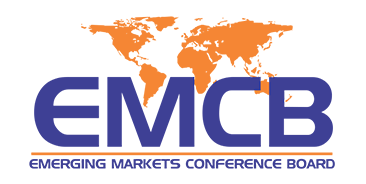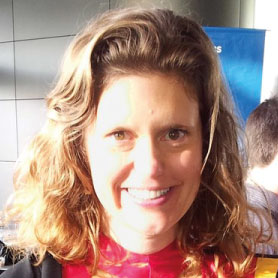

Conference Tracks & Track Chair
- Managing Brands and Products for New Age Marketing
- Sales Leadership in Experience Era
- Consumer Behaviour and Psychology in Experience Age
- Enhancing Employee Experience for Marketing Performance
- Leading Customer Experience in Services
- Managing Retail and Shopper Experience
- Marketing Experience in B2B Context
- Marketing Communication for Enhanced Customer Journey
- Leveraging Social and New Age Media for Marketing Productivity
- Integrating Technology for Marketing Experience
- Managing Experience for Rural Consumers and Markets
- Deciphering Numbers and Analytics for Customer Experience
- Innovative Business Models for Experience Economy
- Managing Experience Across Platforms Based Businesses
- Economic Models for Evaluating Marketing Experience
Track Description:
Track 1 : Managing Brands and Products for New Age Marketing
Brand Management has changed tremendously in the last 15 years. Technology, media and globalization has majorly contributed to it. While some think technology has introduced complexity into modern brand management, it also offers several important parts of the solution. In the Information Age, brand management needs to be looked at from four different angles. Change in the markets, Changes in the framework for brand management, Change required in the Marketing activities and finally the Change required for organizations to continuously improve. This moment of transformation provides a launchpad for marketing to seize new possibilities in terms of-
i) Organize for expertise around a new set of both creative and technical competencies.
ii) Have “Start Up” thinking
iii) Effective use of social media

Dr Abhigyan Sarkar
Assistant Professor

Dr Jatinder J. Singh
Professor
Track 2: Sales Leadership in Experience Era
Personal selling and sales management research has typically focussed on building customer relationships and generating sales revenue. While these topics remains ongoing areas of interest, new directions and challenges are emergent as organizations transition to customer-centric structures where superior customer experiences is the competitive advantage, and in a marketplace unrelentingly disrupted by exploding technologies, data and artificial intelligence. This track invites submissions that address the broad strategic, managerially tactical and emergent topics in sales and sales management. Strategic topics include the role of sales leadership in gaining the power and influence necessary to drive a customer experience agenda and to integrate AI technologies in the sales function. Tactical topics include building trust in an age of abundant information, empowered customers and smart products/services. Emergent topics include the influence of information, intelligence and technologies on the nature and demand for sales profession/function in organizations and society.

Dr Rakesh Singh
Professor, Marketing
School of Management, Bennett University, India

Dr Jagdip Singh
Professor
Track 3: Consumer Behaviour and Psychology in Experience Age
Understanding what people buy is no more a guessing game. Businesses have understood that consumer behaviour and psychology are behind the decision to buy or not buy a product or service. It is all about how an individual or a group acquire, use, experience, discard, and make decisions about goods and services. Every interaction that an enterprise has with the customers or users — generates an experience. The experience may be intended or accidental, positive or negative, but feelings are always generated as a result. This heavily influences marketing strategy of an organization. Providing customer experience can expedite decision-making process, social persuasion, and motivation to help marketers understand why shoppers buy some things but not others. Because businesses need to understand their customers to develop products and marketing campaigns that appeal to their target audience, understanding consumer psychology has become the need of the hour. With experience economy era, the need to understand customer psychology becomes even more important as they have an important role to play in customer decision making.

Dr Sita Mishra
Associate Professor

Dr Piyush Sharma
Professor
Track 4: Enhancing Employee Experience for Marketing Performance
Transparency and the rising demand for fast changing skills of talented employees will make employee experience an increasingly important dimension for sustenance in a globally competing business world. Rather than focusing on employee engagement and culture, organizations are developing an integrated focus on the entire employee experience. Just as organizations have moved beyond customer satisfaction to look at total customer experience, similar refocus is happening in context of employee experience bringing together all the workplace, HR, and management practices that impact people on the job. Providing an engaging experience will help companies succeed in attracting and retaining skilled employees. A strong employee experience directly impacts a strong customer experience (Tylor, 2016).

Dr Bindu Gupta
Professor

Dr Sushanta Kumar Mishra
Professor
Track 5: Leading Customer Experience in Services
Superior service and customer experiences build customer loyalty, turning them into promoters who tend to buy more, stay longer and make referrals. Creating service experiences that consistently impresses and differentiates the firm remains difficult. We explore the role leadership, change management, quality and productivity improvements (incl. cost-effective service excellence), frontline employees, operations (incl. AI, robotics) and marketing (incl. analytics, big data and social media) have in creating an experience that can truly delight customers.

Dr Tripti Ghosh Sharma
Associate Professor

Dr Jochen Wirtz
Vice Dean & Professor
Track 6: Managing Retail and Shopper Experience
“There is no such thing as a typical customer journey anymore,” says Jill Ross, managing director at Accenture’s retail consulting practice. The real challenge is to build experiences, irrespective of online or offline, so that customers can enjoy a great shopping experience whenever, wherever and however they choose to. This is a period of both great upheaval and great opportunity for organizations. They should be open to leveraging technology to meet their customers’ expectations. As this disruption continues, the brands that survive will find ways to improve shopping experiences, expand or maintain margins, and provide consumers with the most satisfying post-purchase and loyalty-building interactions.

Dr Ram Mohan Dhara
Assistant Professor

Dr Dhruv Greval
Professor
Track 7: Marketing Experience in B2B Context
Whether that customer comes back or refers you to others depends on their experience. Organizations need to tap into their existing marketing ecosystem and utilise ideas to create a memorable experience. Thus, not only will they enhance efficiency benefits, but also an improved and consistent customer experience. Companies should craft their marketing message with embedded promise of delivering on the promises they can create ‘positive emotional response’ into their customer journey. When the other business sees you as offering care, convenience, and the necessary prescription for their needs they start believing in your customer experience which eventually enhances your bottom line and brand reputation. These activities will increase customer equity which is comprised of three components – value equity, brand equity and relationship equity. Customer equity is the key ingredient of customer life time value.

Dr Sandeep Puri
Associate Professor

Dr Wesley J. Johnston
Professor
Track 8: Marketing Communication for Enhanced Customer Journey
Marketing communication plays a fundamental role in driving sales and generating high overall profits. Though it is a myth that marketing communication only impacts consistent sales. It impacts customer journey through all the stages customers go through when interacting with a company, from buying products to accessing customer service on the phone to airing grievances on social media. Defining the unique preposition offered and being consistent in the messaging helps add and retain customers. Organizations need to view the whole customer journey as a relationship ladder. The aim is to attract a prospect, build a relationship with them and ultimately encourage advocacy of your brand.

Dr Chetna Monga
Assistant Professor

Dr David W. Stewart
Professor
Track 9: Leveraging Social and New Age Media for Marketing Productivity
New age media has turned into an important player in the marketing field and it is important for organizations to realize its true and massive potential. Social and New Age media is constantly morphing and evolving into meeting advertising and marketing needs leaving marketers with endless prospects. Keeping loyal customers updated with new products and services has become easy and spreads the message to millions at a fraction of the cost. It enables addressing complaints, reviews, suggestions and other aspects of customer relationship management very promptly. In time Marketing strategies can be modified based on online response, sales conversion rates, customer feedback and reviews. Choosing a good combination of techniques and tools of new age media like SEO, social media Marketing, pay per click, emails, content writing etc. can ensure steady flow of customers and enhance marketing productivity.

Dr Bikramjit Rishi
Associate Professor

Dr Linda Hollebeek
Associate Professor
Track 10: Integrating Technology for Marketing Experience
In the age where customers expect brands to deliver exactly what they want in a jiffy, marketers are using integrated data and technology to understand their audience and to make timely connections with consumers. Companies need to develop their strategies and objectives based on clear insights. They can do this by putting effective marketing technology in place to understand 1) how the consumer is changing, 2) which channels are experiencing growth, and 3) why such changes are occurring. At the same time, tech-fuelled marketing highlights the need for marketers not to abuse their power. Marketers must exercise self-control and resist the urge to overwhelm consumers by sending too many messages, as well as sending messages that are not concise. Having millions of terabytes of data is not sufficient, if it does not result in anything for the organization. The real value comes when data and technology are integrated to deliver relevant and engaging customer experiences.

Dr Poonam Garg
Professor

Dr Mark Peterson
Professor
Track 11: Managing Experience for Rural Consumers and Markets
The most overlooked opportunity lies with the rural consumers. Now technology is making it easier to connect with them. The next trust point in the rural consumer’s journey is the act of purchase. It is important for organizations to take notice of the early signals that today’s rural consumer wants a more superior shopping experience, the kind that their urban counterparts have access to. In the future, store format – location, size and layout – will be critical for attracting rural consumers. Opening just a few flagship stores rather than large number of branded stores goes a long way to inspire trust and build brand recognition. Organizations will also need to think of ways to improve the quality of the post-purchase experience which determines the likelihood of repeat purchases, as rural consumers are constantly evaluating the product’s performance and the company’s attitude toward them during delivery of after-sales service.

Dr Harvinder Singh
Professor

Dr Madhubalan Viswanathan
Professor
Track 12: Deciphering Numbers and Analytics for Customer Experience
Customer Experience (CX) is the net sum experience of a customer at the sensory, emotional, rational and physical level based on the engagement with an organization/business/brand over the entire duration of being “customer”. Many believe customer experience starts from the time the customer was not yet a customer and was not even evaluating your product. Customer’s experience of your organization started when they heard your marketing messaging which played an important role in converting them into prospects. As the prospects continued to evaluate your product offerings, this messaging built on and set their expectation of customer experience when conducting business with you. Analytics is helping organisations to uncover issues and comprehend their magnitude so that organisations can address those pain points which are most impactful for their customers and businesses. The benefits of deciphering numbers include understanding customer value preposition and loyalty. It leaves the guesswork out by tracking consumer behaviour, record support interactions and question the reasoning for customer dissatisfaction.

Dr Abhishek
Associate Professor

Dr Arnab K. Laha
Associate Professor
Track 13: Innovative Business Models for Experience Economy
Given the ever-growing nature of smartphone and internet penetration, there is a huge opportunity for innovative business models in consumer space. Many technology companies have exploited the new developments in technology field to come out with businesses which has defied traditional ways of doing businesses. While these business models have been driven by technological innovations, they have also influenced consumer behaviour. For example, cutting edge mobile technology is already changing the way business is done. Given the “always on” nature of mobile devices, they can deliver a more relevant and personalised experience to users based on their location and other preferences. This has resulted into longer smartphone usage and higher adoption of mobile apps, continuing to grow enabling businesses to expand to more users. Right from ordering online to in-app cashless payments, booking rides to the table reservations has made transactions efficient and less time consuming. Understanding and engaging customers via mobile phones is rapidly becoming the forefront of customer experience. This track will examine the scope, influence, and impact of innovative business models for driving marketing in experience economy.

Dr Sapna Popli
Professor

Dr Gerard Tellis
Professor
Track 14: Managing Experience Across Platforms Based Businesses
Platform based businesses are not just about embedding the underlying technology with processes but about understanding and creating the whole business and how it will create value for and build a network of customers. People adopt technology that saves their time or makes things simpler for them. It helps minimize the friction on the path to purchase through smartphone apps by letting customers get whatever they want and whenever they want, with minimal interference. Organizations who build platforms to make their shopaholic customer’s lives more convenient are more expected to witness an increase in the customer experience and hence profitability.

Dr Sandip Mukhopadhyay
Associate Professor

Dr James Agarwal
Professor
Track 15: Economic Models for Evaluating Marketing Experience
With the onset of the experience economy, entrepreneurs and enterprises have come up with many new business models for marketing exchanges throughout the developed and developing world. Some of them have been immensely successful and have challenged the traditional models which had lasted for decades. The sustainability of new business models has also differed from the typical approaches which guided traditional models. Accordingly, the traditional models of evaluating business performances have been challenged. The most quoted example in this context is about the valuation of Uber when traditional discounted cash flow models were challenged and user- based valuation was considered more appropriate. The focus of this track will be to examine some of the new economic models for evaluation of businesses which have been adopted by marketers in marketing experiences globally.

Dr Shekhar Kumar Sinha
Adjunct Professor

Dr Mornay Roberts Lombard
Professor